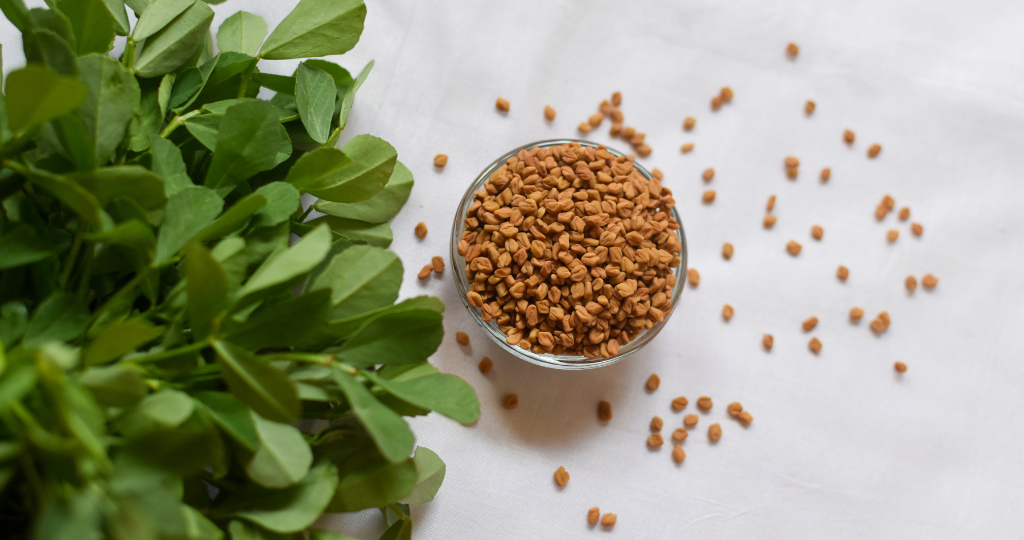
Top 8 Health Benefits of Consuming Methi Juice
Methi, also known as fenugreek, has been used for centuries in Indian home remedies and Ayurvedic medicine. Extracted from the small, green methi seed, methi juice is overflowing with nutrients and plant compounds that provide powerful health benefits.
Read on to learn all about how drinking methi juice can dramatically improve digestion, blood sugar regulation, energy levels, heart health, and more!
What is methi?
Methi (Trigonella foenum-graecum) is an annual herb belonging to the Fabaceae family. For 4,000 years, methi has been cultivated across India, North Africa, and parts of Europe.
Both the small, bitter seeds and green leafy parts have long been used to flavour foods, dye cloth, and treat medical ailments in Ayurvedic practices. Today, methi remains a staple ingredient in Indian vegetarian cuisine.
Dried methi seeds offer nutritional benefits. But methi juice made from the fresh leaves packs a more potent medicinal punch.
Nutrition profile of methi juice
Methi juice overflows with vital micronutrients and plant compounds responsible for its broad therapeutic effects, including:
- Dietary fibre - helps curb appetite and cleanses the colon.
- Minerals like iron, magnesium, calcium, phosphorus, and zinc - are critical for oxygen transport, nerve transmission, immunity, bone health, and metabolism.
- Antioxidants like quercetin, kaempferol, and vitexin – prevent cell damage from free radicals.
- Phytoestrogens like apigenin and luteolin - regulate hormones and protect the heart.
- Vitamins C, K, and folate - boost immunity and energy production.
This nourishing beverage also has trace amounts of B vitamins, manganese, copper, choline, tannins, and alkaloids. Together, these nutrients generate diverse wellness benefits.

8 evidence-based health benefits of methi juice
Traditional practices have treasured methi juice for a good reason. Modern studies now confirm traditional claims on methi's effectiveness.
Controls blood sugar levels
Multiple clinical studies have demonstrated that methi juice can help regulate insulin secretion and sensitivity. It helps lower both fasting blood glucose levels and post-meal spikes in people with diabetes.
The soluble fibre in methi slows down carbohydrate digestion and absorption, while other compounds like trigonelline work to delay gastric emptying. Together, these effects prevent blood glucose levels from rising too rapidly after meals.
Lowers cholesterol
Numerous controlled trials and meta-analyses have found that methi significantly decreases both LDL "bad" cholesterol and total cholesterol levels in the blood. At the same time, it raises protective HDL "good" cholesterol levels.
Compounds like apigenin, luteolin, selenium, vitamin B3, and soluble fibre in methi all contribute to enhanced cholesterol excretion and removal. By lowering blood lipid levels, methi juice helps prevent atherosclerotic plaque deposits from accumulating along artery walls over time.
Aids digestion and gut health
Methi juice contains prebiotic fibres that help feed and increase healthy gut flora. Its mucilaginous soluble fibre also helps coat and soothe intestinal lining that has been irritated by spicy or acidic foods. By promoting beneficial bacteria growth and healing peptic ulcers, methi juice supports improved nutrient absorption and helps minimise uncomfortable gas and bloating issues.
Provides antioxidant protection
Free radicals produced internally from cellular metabolism or externally from pollution, poor diet, stress, and ageing can damage cells over time. Methi juice helps combat oxidative stress by providing antioxidant vitamins C and E, along with flavonoids like quercetin.
These antioxidants help defend healthy cells in the skin, organs, muscles and joints from becoming oxidatively damaged and inflamed.

Boosts cardiovascular function
By optimising blood lipid levels and glucose tolerance and lowering systemic inflammation, methi juice helps keep the heart and blood vessels functioning smoothly. Mucilaginous compounds and apigenin in methi help relax arteries and optimise blood flood. The high vitamin K content also protects against excessive clotting and calcification in blood vessels over time.
Increases stamina and reduces fatigue
Methi has long been used in ancient medicinal systems like Ayurveda and Unani to help boost strength and energy levels. Recent clinical trials have now confirmed that methi supplementation can provide more physical vigour and stamina while also lowering subjective fatigue. As an adaptogenic herb, methi helps nourish the glands and cells that manage human energy reserves and stamina.
Enhances weight loss results
The soluble fibre in methi juice can expand significantly in the stomach, improving satiety signals to the brain so you eat less at meals. Other bioactive compounds influence metabolism, fat-burning and weight control as well. Research studies confirm people taking standardised fenugreek supplements lost significantly more body and fat mass compared to placebo control groups.
Alleviates menstrual problems
For ages, methi tea and herbal supplements have been used traditionally to help relieve a wide range of premenstrual and menopausal symptoms, including menstrual pain, heavy bleeding, and mood swings. Researchers believe this is likely due to methi gently helping boost estrogen levels while also enhancing liver detoxification pathways. Together, this may help restore female hormonal balance.
Methi juice benefits for female reproductive health
Eases PMS and painful period cramps
Methi has chemicals that balance hormones like estrogen. This helps smooth out mood swings, headaches, bloating, and painful cramping before and during your monthly bleed. The anti-inflammatory properties also relax the uterus, reducing cramp severity.
Cools unpleasant menopause symptoms
Methi acts a bit like estrogen in the female body. So it can help manage hot flashes, night sweats, vaginal irritation, and other discomforts that show up during menopause changes. This makes methi a safer choice than hormone pills.
Boosts breast milk production
Methi helps new moms make more breast milk after birth to feed their precious baby. It encourages the body to release more prolactin - the key hormone that produces breast milk.
Protects lady parts and fertility
Early studies in mice indicate methi might help with issues like ovarian cysts, irregular cycles, and difficulty getting pregnant. It assists in healthy ovulation and makes the womb welcoming for embryo implantation.
Ignites sexual desire
Traditionally, methi has been used to lift female libido. Science shows it sparks arousal signals and increases blood flow to sensitive pelvic areas.
How to prepare fresh methi juice
Methi juice is easy to make at home using just a few simple ingredients. It provides a nutritious and refreshing beverage full of health-promoting compounds.
Ingredients
To make roughly one serving of methi juice, you will need:
- 1 large bunch of fresh methi leaves (about 2 packed cups of leaves removed from stems)
- 1-inch piece of fresh ginger root
- 1 to 1 1/2 cups of water
- Optional sweeteners like honey, maple syrup, or stevia to taste
- Lemon juice (1 tbsp)
Methi leaves
Choose fresh, vibrant green methi leaves, ideally picked right before use. Rinse leaves and pat dry thoroughly. Remove any thick stems which can be bitter or fibrous when blended.
Ginger Root
Ginger adds a wonderful zing and boosts the therapeutic effects of the juice. Peel thin skin and chop ginger into small pieces before adding to the blender.
Blending
Place methi leaves in a powerful blender or food processor able to liquefy greens. Add chopped ginger and water. Blend on high speed until very smooth, bright green juice forms. Add more water if needed to reach the desired consistency.
Straining
Use a fine mesh sieve, nut milk bag, or layers of cheesecloth to remove leftover fibrous pulp from the juice. This leaves only the liquid juice extract behind with great taste.

Flavours
Mix in preferred natural sweeteners such as honey, maple syrup or stevia to mellow bitterness. Also, stir in fresh lemon juice to enhance flavour. Adjust sweetness and tartness to taste preferences.
Enjoying
Drink the methi juice right after preparing for maximal nutrition and flavour. Some foam may form on top - stir back in before drinking. Can chill in the fridge for up to 3 days. Shake before drinking if separation occurs. Enjoy daily!
Possible side effects and precautions
Methi juice has an excellent overall safety profile. But a few things to keep in mind when drinking it regularly:
- The bitter taste can be off-putting until you acquire the taste. Add lemon or honey to improve flavour.
- It may cause mild diarrhoea or upset stomach when first introduced to the digestive system. Start with small doses.
- It is not suitable for pregnant women as it can stimulate uterine contractions.
- Those on diabetes or high blood pressure medications should monitor levels closely and adjust meds as needed with professional guidance.
As with any supplement, consult your Ayurvedic practitioner to guide you. Stop drinking methi juice if any discomfort arises, and address the reaction with your doctor.
You might also check our, Methi capsules.
Experience the healing goodness of methi juice
In India, methi, in its many forms, has been relied on as a versatile home remedy for good health for thousands of years. Now, modern studies explain the science behind methi's effectiveness.
With incredible benefits for blood sugar regulation, cholesterol levels, gut health, antioxidant status, fatigue, PMS discomfort, weight control, and much more, methi juice deserves a permanent place in your daily health regimen.
Its slightly bitter, earthy flavour is an acquired taste but becomes enjoyable over time. Experiment with methi juice recipes to discover your favourite way to drink it.
Centuries of Ayurvedic healers can't be wrong. Consume methi juice as a tonic, use the paste externally for skin issues, or add sprouted methi seeds to dishes.
However you use it, incorporating more methi into your routine lets you tap into powerful medicine from nature's pharmacy!








Leave a comment
This site is protected by hCaptcha and the hCaptcha Privacy Policy and Terms of Service apply.